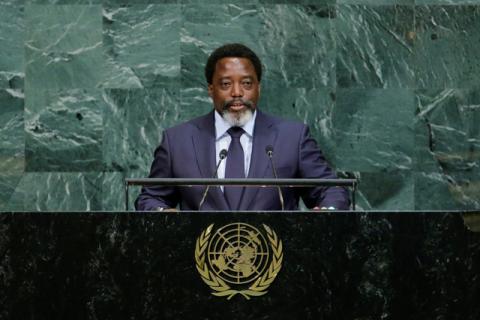Advertisement
No Congo election until mid-2019, says electoral commission
KINSHASA (Reuters) - A long-delayed election in Democratic Republic of Congo to replace President Joseph Kabila cannot take place until at least April 2019, the electoral commission said, a schedule certain to enrage opponents who say Kabila is clinging to power.
The polls were originally scheduled for November 2016. The schedule outlined by the electoral commission would torpedo an agreement between Kabila's representatives and his opponents that the election would take place before the end of this year.
Dozens of people died last year in protests against Kabila's refusal to step down at the end of his term. Parts of the country are in the hands of insurgents who say they will not stop fighting while he remains in power.
Congo's electoral commission said in a statement following a meeting with civil society representatives on Tuesday that it would need at least 504 days to organise the poll once voter registration is completed.
Enrolment began in parts of the country's insurrection-ravaged Kasai region in mid-September and the commission says it will, in principle, take about three months. That means the vote could not be organised until April 2019 at the earliest.
The commission is expected to release a calendar for the presidential and other elections this month.
The opposition accuses Kabila of trying to cling to power by postponing elections until he can find a way to remove constitutional term limits that prevent him from standing for re-election, as his counterparts in neighbouring Rwanda and Congo Republic have done.
Kabila, who took power after his father Laurent Kabila was assassinated in 2001, denies he intends to remain in office, and says the election delays are due to difficulties enrolling millions of voters and mobilising hundreds of millions of dollars in financing.
Congo has never experienced a peaceful transition of power and Kabila's refusal to step down last year has fuelled mounting insecurity across the country, where millions died in regional conflicts between 1996-2003, most from hunger and disease.
An insurrection in Kasai has killed up to 5,000 people and displaced 1.4 million more since last August, and militia violence has also spiked in the eastern borderlands, where dozens of armed groups are active.
(Reporting by Patient Ligodi and Aaron Ross; Editing by Joe Bavier and Peter Graff)



















Add new comment